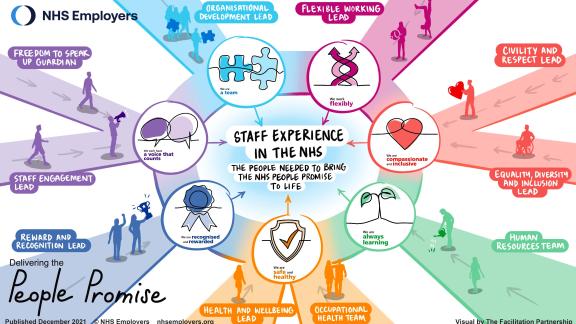Evidence-based approaches to workforce wellbeing

Although there is no one-size-fits-all approach to improving the wellbeing of your workforce, the evidence base on the most effective initiatives and approaches is constantly evolving and can provide a useful basis for reviewing your approach and making decisions as we know how important it is to retain our valued NHS workforce.
The NHS Long Term Workforce Plan and the NHS People Promise explore how having a positive staff experience and a rounded support offer are vital to encouraging staff to remain in the workplace. The information provided below can support you in making informed choices to look after our NHS colleagues.
The evidence base can be useful across your health and wellbeing strategy, including to:
- build your business case and gain buy-in for change
- inform decision making and help focus your approach, including funding decisions
- guide your approach to evaluation and reviewing your strategy.
The workplace health and wellbeing evidence base is constantly growing and evolving – do you know about a key study we haven’t included here? Let us know by emailing us.
Overview of the health and wellbeing evidence base
NHS Employers commissioned the Institute of Employment Studies to undertake a rapid evidence review of the evidence base of health and wellbeing interventions used in healthcare and their implications for wellbeing outcomes. The key learning generated by this review is summarised below. You can find out more in the full Health and Wellbeing Interventions Rapid Evidence Review, published in October 2020.
- There is no single one-size-fits-all solution for workforce wellbeing. Interventions with good take-up and which led to positive wellbeing outcomes were those where healthcare staff had options as to which interventions they could engage with and suited their wellbeing needs.
- The quality and extent of the evidence base is variable and needs more attention. Organisations often use a broad range of interventions, focusing on both mental and physical wellbeing, treatment-based and prevention focused interventions. The extent to which these interventions are robustly evaluated is variable. Organisations should pay great attention to evaluating their approaches, including both wellbeing outcomes and process evaluation, and may find it useful to partner with research organisations to do this robustly.
- A whole-system approach to wellbeing should be considered alongside interventions. This includes a focus on the whole employment experience, including element such as workload, autonomy, employee voice and management processes.
Our eight elements of positive staff experience web page details the eight elements that are essential for creating, implementing and evaluating an effective staff experience strategy.
The below documents and reports have been influential in shaping thinking and approaches in health and wellbeing across the NHS. These may help you to develop and review your health and wellbeing approach.
Why workforce wellbeing matters
The evidence base for why workforce wellbeing matters is well established. You might want to refer to the learning from these reports, studies and evidence to build your case for making changes in your organisation:
- The Francis Inquiry into Mid Staffordshire NHS Foundation Trust revealed the fatal impact of disconnected and detached staff with poor mental wellbeing and a lack of empathy and emotion.
- There is well-established evidence base demonstrating that poor wellbeing is correlated with poorer patient outcomes, summarised in the Healthcare Staff Wellbeing, Burnout, and Patient Safety systematic review
- Better staff experience overall is linked to better wellbeing, lower turnover and lower sickness absence, as outlined by The Kings Fund, 2018.
- Poor mental health in the NHS equates to £1,794- £2,174 per employee per year, according to HEE’s Staff and Learners’ Mental Wellbeing Report, 2019 (PDF)
- Institute of employment studies report summary: Presenteeism: A review of current thinking
- Commissioned by The International Public Policy Observatory (IPPO), a rapid evidence review and economic analysis looks at the financial impact of poor NHS staff mental health and wellbeing, and what can be done to improve it.
- The Chartered Institute of Personnel and Development (CIPD) Health and wellbeing at work, 2022, annual survey exploring health, wellbeing and absence in UK workplaces
- Economics of mental wellbeing: A prospective study estimating associated productivity costs due to sickness absence from the workplace in Denmark. This study uses data from Denmark to explore how different levels of mental wellbeing influence productivity costs and to estimate associated productivity loss on a national level. Take a look at What Works Wellbeing blog with considerations the study’s methodology and key findings, and what the insights mean in the context of workplace wellbeing in the UK.
- Latest research from the University of Southampton has found long shifts combined with poor staffing levels and little choice in working patterns are likely to be behind nurses experiencing burnout and exhaustion.
- The Society of Occupational Medicine (SOM) has produced an evidence-based report calling for a new strategy to tackle burnout. Burnout in healthcare: risk factors and solutions recommends a series of primary, secondary, and tertiary interventions employers can take, aimed at protecting employees against burnout and supporting those returning from absence to do so safely.
- The value of Occupational Health and Human Resources in supporting mental health and wellbeing in the workplace is the latest report from Dr Kevin Teoh at the Society of Occupational Medicine and aims to encourage more effective interventions to support employees and colleagues in managing their mental health.
Health and wellbeing in the NHS workforce
There has been a plethora of research, studies and reports outlining the state of health and wellbeing for the NHS workforce, and making recommendations for change and improvement. Here are three seminal reports exploring wellbeing in the NHS:
- NHS Health Education England NHS staff and learners' mental wellbeing report, February 2019 - This report, led by Commission Chair, Sir Kenneth Pearson, reinforces the importance of promoting and supporting the wellbeing of NHS staff and those learning in NHS settings. The report examines at what the NHS are doing currently, where there is excellence and where the NHS can aspire to excellence. Take a look at our dedicated web page which can help support you to implement some of the recommendations from this report.
- The Boorman Review, November 2009 (PDF) - The final report of the independent NHS Health & Well-being Review was published on 23 November 2009. The report reiterates the case for change, and provides a comprehensive set of recommendations for improvement in provision of health and wellbeing across the NHS.
- Thriving at work - The Stevenson/Farmer review of mental health of employers, October 2017 Following the request from the Prime Minister at the beginning of 2017, Paul Farmer and Dennis Stevenson undertook an independent review into how employers can better support the mental health of all people currently in employment including those with mental health problems or poor wellbeing to remain in and thrive through work. This extensive report includes recommendations employers can adopt regardless of their workplace type or size. Our dedicated web page can help support you to implement some of the recommendations from the report.
- Five-year workplace wellness intervention in the NHS, June 2013, shows improvements in health behaviours, reductions in sickness absence and improvements in job satisfaction and organisational commitment were observed following five years of a workplace wellness intervention for NHS employees. These findings suggest that health-promoting programmes should be embedded within NHS infrastructure.
- The annual NHS Staff Survey is one of the largest workforce surveys in the world and is carried out every year to improve staff experiences across the NHS.
Initiatives in practice
There are a broad range of preventative and treatment-based physical and mental health initiatives, although there is no single best approach.
Read section four of the IES report: Health and Wellbeing Interventions in Healthcare: A rapid evidence to find evidence specifically relating to interventions from the NHS.
Below we’ve also curated a set of research studies around common health and wellbeing themes to inform and guide your approach.



